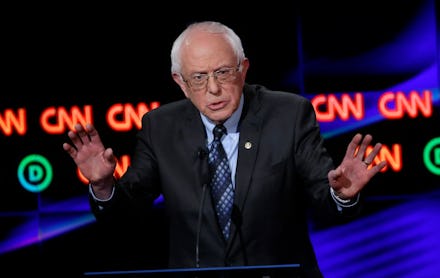There's One Big Problem With Bernie Sanders' Comments About White People and Ghettos

All people of color don't live in so-called "ghettos," Bernie Sanders.
That's the message that's bubbling up online after Sunday night's CNN's Democratic debate in Flint, Michigan, where host Don Lemon asked both Sanders and his opponent Hillary Clinton to identify their "racial blind spots."
Sanders' answer was telling — but for all the wrong reasons.
He said white Americans "don't know what it's like to be living in a ghetto and to be poor," which immediately drew criticism from MSNBC contributor Joy Reid on Twitter:
Others chimed in too:
Every black person in America is not poor, but black Americans have the hardest time maintaining their wealth. In fact, as Harvard University scholar Henry Louis Gates Jr. wrote in the New York Times recently, black America has been characterized over the past 50 years by a growing class divide. "When adjusted for inflation to 2014 dollars, the percentage of African-Americans making at least $75,000 more than doubled from 1970 to 2014, to 21%" Gates wrote.
Jamelle Bouie recounted at Slate that the Great Recession basically obliterated a generation's worth of black families' wealth by luring hundreds of thousands of African-American homeowners into subprime mortgages. Racial wealth gaps have only grown since the Great Recession:
Perhaps most dangerous of all, Sanders' comments fail to acknowledge racism as an institutional and systemic force, rather than an interpersonal one. Sure, racism happens when a lone police officer decides to racially profile a young black man in an impoverished neighborhood, but it also happens when the top U.S. banks only give four black homeowners loans in one year in a major U.S. city.
And that recognition has to be at the heart of any true racial justice platform for change.